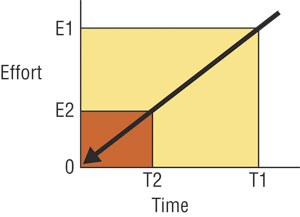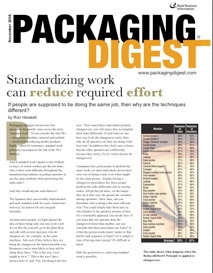

<h1>Paradigms</h1>
Packaging digest Article page 2
Let's pretend that the fastest operator has the best change over procedure. If we then document those exact procedures, give them to other operators and tell them to do it this way from now on, they may try it. In the long run, though, they will return to the way they always did it.
Doing it the old way rather than changing to the new way is simply easier. The old way has been memorized. Learning a new way takes extra work. The lesson: Standard work can't be dictated.
Experience has shown that despite being given a more efficient way to do their work, operators tend to return to the old, inefficient methods: This is one of the big reasons standard work continues to be talked about, yet rarely is successfully implemented. The explanation involves personal paradigms. A paradigm can be a method or way of doing something; paradigms form when we repeatedly perform a series of tasks. The longer we perform the tasks, the more the paradigms blind us to possibly better methods. Paradigms make change more difficult. After performing a series of tasks for an extended time, our paradigm, or our way of doing the tasks, becomes the only way to do the tasks. This is why people fight change, even when it can benefit them.
Focus on effort
Achieving standard work can be accomplished with a new approach that also effects a positive culture change. By focusing on effort instead of time, operators can accomplish the following goals:
1. Reduce the time it takes to perform tasks
2. Increase efficiency
3. Reduce wasted labor
4. Enhance productivity
5. Cut costs
6. Establish sustainable results
7. Illustrate principle
8. Increase innovation on the floor
9. Affect a cultural change that empowers people
-
10. Produce standard work for all operators
-
11.
Why is a focus on effort more valuable than a focus on time, especially when, in the case of change overs, the objective is to reduce downtime? It's simple: Operators will happily work less for the same pay. When the focus becomes reducing the operator's effort, operators willingly engage in the process. In fact, they not only engage, they understand that reducing their effort produces an easier way to do their work. The key here is ownership: When they create the new procedures list, operators readily accept them. Having developed the new procedures themselves, they take active ownership in sustaining them, thus changing old paradigms and creating a new, common, paradigm.
When we focus on effort, time becomes a factor. As effort is reduced, the amount of time to accomplish the work automatically decreases.

As the effort drops, time automatically decreases without suffering quality to expediency.
©2007 - 2011 Reduced Effort Inc. All rights reserved
Phone: 1-209-814-9198 Email: ron@reducedeffort.com

